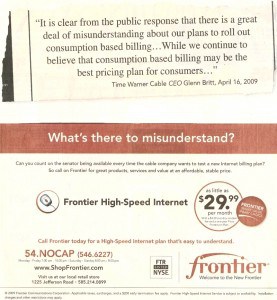
[Update 6:22pm EDT — If you are in the Austin area and you have had your service cut off for “over use,” please contact me immediately using the Contact form on the top of your screen. Thanks!]
First Time Warner (via TWCAlex on Twitter) told customers who fought back the caps that the company was reneging on the DOCSIS upgrade, at least for now, and was taking their toys home with them.
But now the hissy fit might be extending into a usage crackdown in at least one of the “test” cities. Because the promised “listening tour” of customer concerns is nowhere in sight, and the company has instead relied on a Re-Education campaign involving astroturfing lobbyists and propaganda, StoptheCap! launches a new feature this morning for any and all ISPs who throw tantrums when customers rebel and don’t allow providers to do whatever they want.
HissyFitWatch reports on ISPs who suddenly develop a bad attitude when things just don’t appear to be going their way.
Austin StoptheCap! reader Ryan Howard kicks off our premiere edition with a report that his Road Runner service was cut off yesterday without warning. According to Ryan, it took four calls to technical support, two visits to the cable store to try two new cable modems (all to no avail), before someone at Time Warner finally told him to call the company’s “Security and Abuse” center.
“I called the number and had to leave a voice mail and about an hour later a Time Warner technician called me back and lectured me for using 44 gigabytes in one week,” Howard wrote.
Howard was then “educated” about his usage.
“According to her, that is more than most people use in a year,” Howard said.
Howard questioned the company representative about what defines an acceptable amount of usage so he doesn’t get cut off again. He pays extra for Road Runner’s premium Turbo tier, so he already hands more money to Time Warner than average subscribers for his broadband service.
“All she would commit to is less — perhaps half or as quarter as much,” he said.

Time Warner is taking their DOCSIS 3 toys home with them after customers reject Caps 'n Tiers.
Convenient, considering that amounts to 40-60 gigabytes a month, which falls right in line with the now-temporarily-shelved tier pricing.
Ryan felt concerned that the Time Warner representative had such detailed information in front of her about his usage, although the representative reiterated repeatedly that they were not monitoring what he was doing with his account, just how much and when he was using it.
Ryan was upset over the entire ordeal, not only because a Time Warner representative lectured him (and 44 gigabytes, while a considerable amount, is not even close to the terabytes of usage Time Warner usually complains about when they speak about heavy users “abusing” their network), but also because he wasted more than seven hours of his day yesterday making several trips and calls trying to troubleshoot a technical problem that was anything but.
Of course, Time Warner’s own policies for using Road Runner allow them to crackdown on whatever they define represents “abusive use” of their service:
Road Runner Terms of Service — Austin, Texas
The Internet is known as a “shared resource,” and Road Runner accounts operate using these resources. Excessive use or abuse of these shared network resources by one customer may have a negative impact on all other customers. Misuse of network resources in a manner, which impairs network performance, is prohibited by this policy and may result in termination of your account.
You are prohibited from excessive consumption of resources, including CPU time, memory, disk space and session time. You may not use resource-intensive programs, which negatively impact other customers or the performance of Road Runner systems or networks. Road Runner reserves the right to terminate or limit such activities.
Time Warner’s Acceptable Use Policy also allows them to limit and/or throttle service at will:
The ISP Service may not be used to engage in any conduct that interferes with Operator’s ability to provide service to others, including the use of excessive bandwidth.
The ISP Service may not be used in a manner that interferes with Operator’s efficient operation of its facilities, the provision of services or the ability of others to utilize the ISP Service in a reasonable manner. Operator may use various tools and techniques in order to efficiently manage its networks and to ensure compliance with this Acceptable Use Policy (“Network Management Tools”). These may include detecting malicious traffic patterns and preventing the distribution of viruses or other malicious code, limiting the number of peer-to-peer sessions a user can conduct at the same time, limiting the aggregate bandwidth available for certain usage protocols such as peer-to-peer and newsgroups and such other Network Management Tools as Operator may from time to time determine appropriate.
Of course, the company always had these terms and conditions at its disposal to control the “abusers.” One of the benefits of the DOCSIS 3 upgrade, that they have apparently now taken back, is that it dramatically reduces the possibility that a heavy bandwidth consumer will impact anyone else’s service. Why put several cities through the ordeal of forced tier pricing experiments, when they’ve always had the power to manage the traffic on their network? It’s just another reason why we’ve been skeptical about usage caps and forced tier pricing all along.
If Ryan’s experience is an example of what is forthcoming for more customers in the Austin area, we’re concerned.


 Subscribe
Subscribe






